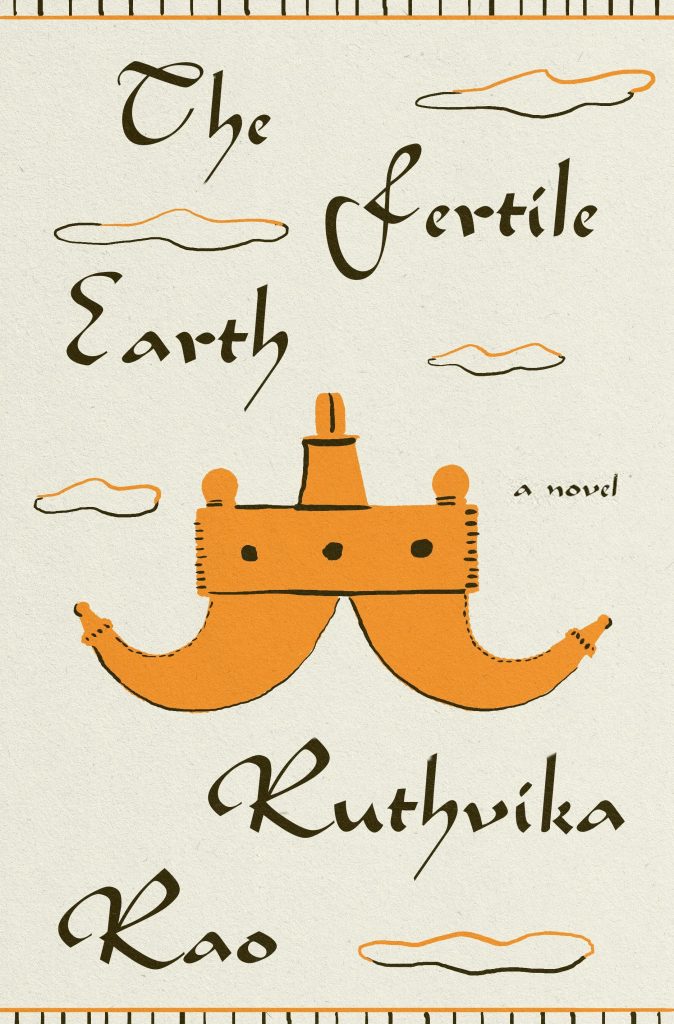Because a love story must occur between two particular people, in a particular society that the characters need to appease or disregard or acknowledge in some way, it also becomes a rich social portrait of that particular place in time; which makes the novels on this list—from a young boyhood romance in 1970s Brazil to unresolved tension between a hotel guest and his guide in South Korea—as much about love as about the entanglements of love and place. And if this place is inaccessible to the English language? It doesn’t matter. The experience of reading fiction is mysterious and unpredictable, full of deceptions and slanted truths and the unexpected pleasures of imagination. In that way it only ever speaks one language.
My own novel The Fertile Earth is a love story between Vijaya and Krishna. When they meet for the first time as children, their connection is magnetic and intense and results in a fateful adventure into the hills surrounding their village; the repercussions of which echo across their lives and the lives of their families. Set in rural Telangana, in the volatile early decades of post-independence India, the novel occurs in a time and place which is totally inaccessible to the English language. But this book exists—by luck and chance and all the people who’ve helped me along the way—yet essentially because English is my first language when I write, though it is my second when I speak.
Here are seven novels, their hearts threaded around a love story, inaccessible to the English language had it not been for their translators’ love of two languages.
The Road to the City by Natalia Ginzburg, translated by Gini Alhadeff
Delia and Nini have been around each other their whole lives. They are both poor, imprisoned in a provincial village that limits their possibilities in life, but there is one road that connects their home to the city; only Delia and Nini have different ways of arriving there. Will they still end up together? This novel is 94 pages long. It is perfect and complete and too poignant and too emotionally rich to be called stark. For longtime Ginzburg fans, it will be gratifying to know that this was her debut, published under the pseudonym Alissa Tornimparte.
The Post-Office Girl by Stefan Zweig, translated by Joel Rotenberg
This novel’s tagline “Cinderella meets Bonnie and Clyde” sounds like a page turner. Indeed, Wes Anderson considers The Grand Budapest Hotel to be influenced by Stefan Zweig’s work. And it is—a page tuner—but for all the right reasons. The novel opens with Christine—our post office girl—sitting in her chair in the middle of a silent afternoon in post-Great War Austria. How will Christine’s path cross with the wounded war veteran Ferdinand? Will their lives head toward happiness or tragedy?
The Love of Singular Men by Victor Heringer translated by James Young
Camilo and Cosme are two boys who unexpectedly fall in love one summer in 1970’s Rio de Janeiro. This novel is a portrait of first love found and lost, and the years that follow, set against a beautifully rendered depiction of Brazilian society during the military dictatorship.
Winter in Sokcho by Elisa Shua Dusapin, translated by Aneesa Abbas Higgins
In this novel, the unnamed narrator is a young French Korean woman who spends her days working at a rundown guesthouse in Sokcho, a small town in South Korea that sits on the border with North Korea. Yan, a French cartoonist, arrives one night to begin an extended stay, looking to Sokcho for inspiration for his artwork. Helplessly intrigued, she and Yan travel together, exchange stories and histories, yet remain complete enigmas to each other. A vivid and mysterious and utterly surprising novel.
The Housekeeper and the Professor by Yoko Ogawa, translated by Stephen Snyder
Every morning, a housekeeper and a professor are introduced to each other; the professor has a traumatic brain injury that allows him only 80 minutes’ worth of short-term memory. Sometimes, the housekeeper brings her son to work with her. Can you forge familial bonds without history? This is a tender, warm-hearted novel about chosen families, what they give you no matter how fleeting your time together.
Kairos by Jenny Erpenbeck, translated by Michael Hofmann
This is a love story set in East Germany in the years before the fall of the Berlin Wall. There is a looming suspicion from the very first page that the relationship between 19-year-old Katharina and 50-year-old Hans will turn insidious—it does—and the hurt will land on only one of them. But which one? The novel is inventive, yet has terrific velocity. Cruelty, passion, self-destruction; these traits are never judged or philosophized, yet the reader understands perfectly how a relationship like this works.
Ties by Domenico Starnone, translated by Jhumpa Lahiri
Aldo and Vanda, long married, return home to Naples after their annual seaside holiday. They find their home robbed and the cat missing. Ties is about family love: Between Aldo and Vanda, between Aldo and the woman for whom he leaves Vanda, between Aldo and his children. What remains of a family broken and put back together? The structure of this novel is intricate and masterful, and like the finest made structures, it is shaped by the storytelling and not the other way around.
Read the original article here

